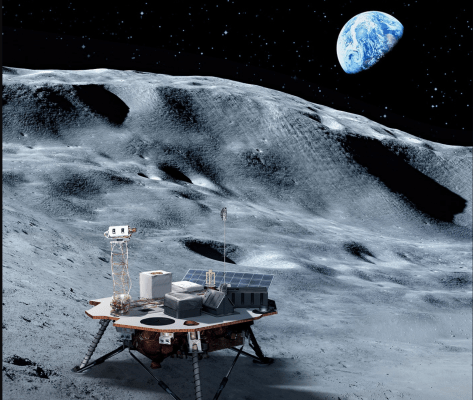
The National Aeronautics and Space Administration has selected Astrobotic, Intuitive Machines, and Orbit Beyond as the first three private companies to deliver science and technology payloads under the Commercial Lunar Payload Services (CLPS) as part of its Artemis program.
In an announcement yesterday, the administration said that each lander will carry NASA-provided payloads to conduct science investigations and demonstrate technologies on the lunar surface to pave the way for NASA astronauts lunar return in 2024. In all NASA will dole out up to $253 million in contracts to the three companies for their respective missions.
“Our selection of these U.S. commercial landing service providers represents America’s return to the Moon’s surface for the first time in decades, and it’s a huge step forward for our Artemis lunar exploration plans,” said NASA Administrator Jim Bridenstine. ”Next year, our initial science and technology research will be on the lunar surface, which will help support sending the first woman and the next man to the Moon in five years. Investing in these commercial landing services also is another strong step to build a commercial space economy beyond low-Earth orbit.”
As part of the submissions, each company proposed flying specific instruments including gear to predict lander positions; measure lunar radiation; assess lander impact on the Moon; and assist with navigation.
It’s not only a win for NASA, and the companies, but another feather in the cap for XPRIZE — given that Astrobotic was initially spun out of Carnegie Mellon University to compete for the Google Lunar XPRIZE (GLXP) in 2007.
The Pittsburgh-based Astrobotic, which is backed by the Space Angels Network, was awarded $79.5 million to fly up to 14 payloads to Lacus Mortis, a large crater on the near side of the moon by July 2021.
Intuitive Machines, out of Houston, received $77 million to fly five payloads to Oceanus Procellarum, a dark spot on the moon in the same timeframe. While Edison, N.J.-based Orbit Beyond is flying four payloads to the lunar lavea plain of Mare Imbrium, in one of the Moon’s many craters by September 2020.
[gallery ids="1835626,1835627,1835629"]
“These landers are just the beginning of exciting commercial partnerships that will bring us closer to solving the many scientific mysteries of our Moon, our solar system, and beyond,” said Thomas Zurbuchen, associate administrator of NASA’s Science Mission Directorate in a statement. “What we learn will not only change our view of the universe, but also prepare our human missions to the Moon and eventually Mars.”
NASA’s partners have agreed to provide end-to-end commercial payload delivery services including: payload integration and operations, and launch and landing.
These first steps from NASA pave the way for not only the Administration’s lunar efforts, but also its eventual intentions to spacecraft and astronauts on Mars.
“This announcement starts a significant step in NASA’s collaboration with our commercial partners,” said Chris Culbert, CLPS program manager at NASA’s Johnson Space Center, in a statement from Houston. “NASA is committed to working with industry to enable the next round of lunar exploration. The companies we have selected represent a diverse community of exciting small American companies, each with their own unique, innovative approach to getting to the Moon. We look forward to working with them to have our payloads delivered and opening the door for returning humans to the Moon.”
Bagikan Berita Ini














0 Response to "Meet the first private companies that NASA has selected to deliver payloads to the Moon - TechCrunch"
Post a Comment